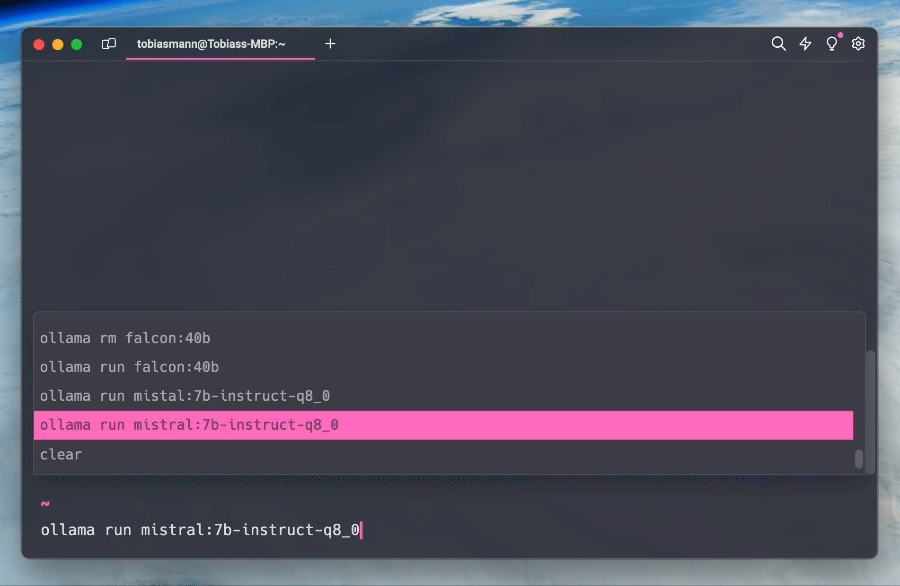[ad_1]
Fingers On With all of the speak of large machine-learning coaching clusters and AI PCs you’d be forgiven for considering you want some type of particular {hardware} to play with text-and-code-generating giant language fashions (LLMs) at dwelling.
In actuality, there’s a great likelihood the desktop system you’re studying this on is greater than succesful of operating a variety of LLMs, together with chat bots like Mistral or supply code turbines like Codellama.
In reality, with brazenly accessible instruments like Ollama, LM Suite, and Llama.cpp, it’s comparatively straightforward to get these fashions operating in your system.
Within the curiosity of simplicity and cross-platform compatibility, we’re going to be Ollama, which as soon as put in works roughly the identical throughout Home windows, Linux, and Macs.
A phrase on efficiency, compatibility, and AMD GPU help:
Normally, giant language fashions like Mistral or Llama 2 run finest with devoted accelerators. There’s a purpose datacenter operators are shopping for and deploying GPUs in clusters of 10,000 or extra, although you will want the merest fraction of such assets.
Ollama gives native help for Nvidia and Apple’s M-series GPUs. Nvidia GPUs with at the least 4GB of reminiscence ought to work. We examined with a 12GB RTX 3060, although we suggest at the least 16GB of reminiscence for M-series Macs.
Linux customers will need Nvidia’s newest proprietary driver and doubtless the CUDA binaries put in first. There’s extra info on setting that up right here.
In case you’re rocking a Radeon 7000-series GPU or newer, AMD has a full information on getting an LLM operating in your system, which yow will discover right here.
The excellent news is, for those who don’t have a supported graphics card, Ollama will nonetheless run on an AVX2-compatible CPU, though an entire lot slower than for those who had a supported GPU. And whereas 16GB of reminiscence is beneficial, you might be able to get by with much less by choosing a quantized mannequin — extra on that in a minute.
Putting in Ollama
Putting in Ollama is fairly straight ahead, no matter your base working system. It is open supply, which you’ll be able to take a look at right here.
For these operating Home windows or Mac OS, head over ollama.com and obtain and set up it like every other software.
For these operating Linux, it is even less complicated: Simply run this one liner — yow will discover guide set up directions right here, if you need them — and also you’re off to the races.
curl -fsSL https://ollama.com/set up.sh | sh
Putting in your first mannequin
No matter your working system, working with Ollama is essentially the identical. Ollama recommends beginning with Llama 2 7B, a seven-billion-parameter transformer-based neural community, however for this information we’ll be looking at Mistral 7B because it’s fairly succesful and been the supply of some controversy in current weeks.
Begin by opening PowerShell or a terminal emulator and executing the next command to obtain and begin the mannequin in an interactive chat mode.
ollama run mistral
Upon obtain, you’ll be dropped in to a chat immediate the place you can begin interacting with the mannequin, similar to ChatGPT, Copilot, or Google Gemini.

LLMs, like Mistral 7B, run surprisingly properly on this 2-year-old M1 Max MacBook Professional – Click on to enlarge
In case you don’t get something, chances are you’ll have to launch Ollama from the beginning menu on Home windows or purposes folder on Mac first.
Fashions, tags, and quantization
Mistal 7B is only one of a number of LLMs, together with different variations of the mannequin, which can be accessible utilizing Ollama. Yow will discover the total listing, together with directions for operating every right here, however the normal syntax goes one thing like this:
ollama run model-name:model-tag
Mannequin-tags are used to specify which model of the mannequin you’d prefer to obtain. In case you depart it off, Ollama assume you need the newest model. In our expertise, this tends to be a 4-bit quantized model of the mannequin.
If, for instance, you needed to run Meta’s Llama2 7B at FP16, it’d appear like this:
ollama run llama2:7b-chat-fp16
However earlier than you attempt that, you would possibly wish to double verify your system has sufficient reminiscence. Our earlier instance with Mistral used 4-bit quantization, which implies the mannequin wants half a gigabyte of reminiscence for each 1 billion parameters. And remember: It has seven billion parameters.
Quantization is a way used to compress the mannequin by changing its weights and activations to a decrease precision. This permits Mistral 7B to run inside 4GB of GPU or system RAM, normally with minimal sacrifice in high quality of the output, although your mileage could range.
The Llama 2 7B instance used above runs at half precision (FP16). Consequently, you’d really want 2GB of reminiscence per billion parameters, which on this case works out to only over 14GB. Except you’ve obtained a more moderen GPU with 16GB or extra of vRAM, chances are you’ll not have sufficient assets to run the mannequin at that precision.
Managing Ollama
Managing, updating, and eradicating put in fashions utilizing Ollama ought to really feel proper at dwelling for anybody who’s used issues just like the Docker CLI earlier than.
On this part we’ll go over just a few of the extra frequent duties you would possibly wish to execute.
To get an inventory of put in fashions run:
ollama listing
To take away a mannequin, you’d run:
ollama rm model-name:model-tag
To drag or replace an present mannequin, run:
ollama pull model-name:model-tag
Extra Ollama instructions may be discovered by operating:
ollama --help
As we famous earlier, Ollama is only one of many frameworks for operating and testing native LLMs. In case you run in to bother with this one, chances are you’ll discover extra luck with others. And no, an AI didn’t write this.
The Register goals to deliver you extra on using LLMs within the close to future, so you’ll want to share your burning AI PC questions within the feedback part. And remember about provide chain safety. ®
[ad_2]


